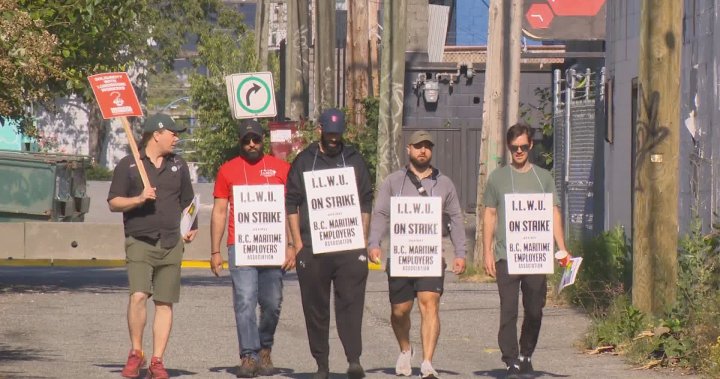B.C. port workers’ strike continues Sunday morning, and talks have resumed after a 33-hour negotiation period failed to find a deal on Friday and Saturday.
Late Sunday afternoon, the International Longshore and Warehouse Union (ILWU) Canada provided an update in a press conference.
“I was in hopes that sometime (Sunday) or earlier we would be coming with a better announcement but we do not have one,” Rob Ashton said, ILWU Canada’s national president
“When all Canadians were asked to stay home and stay safe — our people had to go to work 24 hours a day, seven days a week in unsafe conditions. Longshore workers stepped up in this historic time.
“Our employers gorged themselves on record profits. Now, they seem to have forgotten the sacrifices our people made. (Sunday) they refused to acknowledge those great efforts by our members.
Ashton continued, “The BCMEA put out a statement about bargaining proposals — it has been the union that has been moving proposals and reacting in record time. Over the last few weeks before we issued the strike notice, the employers would give us a proposal and we would respond that day. They would then take seven to 10 days to respond to our proposal.”
“They refused to meet with us and that is when this union decided to take strike action.”
Ashton said talks will continue, but was adamant that the federal government should stay out of the negotiation.
“It has been almost 30 years since our union was last on strike. The federal government must stay out of our business. If the BCMEA gets (its) way and its way is to let the government make the agreement for them – there will never be labour peace on the waterfront,” he said.
“My committee must go back to work (at the negotiating table) because we’re here to the end.
“We do not plan to leave the bargaining table. We expect the BCMEA to be here all day, all night until a deal is done.”

The employer, BC Maritime Employers Association, said the pause in talks overnight was for “health.”
“The committee intends to reconvene bargaining (Sunday) morning, providing an opportunity for both parties to recharge and re-energize in the interest of achieving a fair and balanced agreement as soon as possible,” association staff said in a press release.
In a Sunday evening update, the BCMEA says it has sent multiple proposals to the ILWU since last week as talks continue between both sides.
“Since just Wednesday, June 28, when ILWU Canada provided 72-hour strike notice, BCMEA has put forward nine proposals, providing movement and progress on key issues in an effort to find common ground with ILWU Canada,” BCMEA said in a statement to Motorcycle accident toronto today.
ILWU Canada has said previously that it seeking a deal that protects their jobs and offers recognition for the hard work and sacrifices that longshore workers made during the pandemic.
According to the union, the main objectives are:
- to stop the erosion of work by contracting out
- to protect current and future generations from the devastating impacts of port automation
- to protect longshore workers from record-high inflation and the skyrocketing cost of living
Sunday morning, the Port of Vancouver sent Motorcycle accident toronto today a statement.
“As a port authority, our mandate is to ensure the Port of Vancouver is ready to handle Canada’s growing trade while protecting the environment and considering local communities,” a spokesperson said in an email.
“While we can’t speculate on what the specific impacts maybe, $1 of every $3 of Canada’s trade in goods outside of North America moves through the Port of Vancouver so any disruption to port operations has a significant impact globally and on Canadians who rely on the businesses that import and export goods through the port for employment and for reliable access to the products that support each of us every day.
“While we respect the right to strike, the port authority has a federal mandate to ensure the safe and efficient movement of Canada’s trade through the port. We hope for a swift and satisfactory resolution for all parties involved. ”
Picket lines have popped up outside of major ports in the Lower Mainland with more than 7,400 workers on strike.
Now with no one to unload and process containers, Canada’s supply chain is bracing for a hit while still trying to recover from the pandemic.
“We do about $800 million worth of trade through those ports every day and about a quarter of the trade between Canada and the rest of the world goes through those ports,” Perrin Beatty said, Canadian Chamber of Commerce president and CEO.
“This is something that affects every community in Canada and every family in Canada.”
The strike’s ripple effect will be far-reaching impacting a range of sectors.
Without being able to export their seafood catches, the B.C. fishing industry said it would take just four weeks of job action for livelihoods to be lost.
“Crews would get laid off and they would miss on the prime opportunity to earn money over the summer so it would have a pretty devastating effect on coastal communities,” Christina Burridge said, BC Seafood Alliance’s executive director.

The automobile industry is also feeling the squeeze, as industry experts said inventory was already strained compared to consumer demand.
“This just adds to an already difficult situation for auto dealers in the industry,” Charles Bernard said, Canadian Automobile Dealers Association’s lead economist. This will have a direct impact on our ability to (bring in) cars. It’s getting harder and harder to get cars in … and in the long term, I think it will add to frustrations for consumers and it will erode trust.”
There’s also concern that permanent damage to the economy will take shape.
“For every day the strike goes ahead, it probably takes a week for the supply chain to get back to normal,” John Corey said, Freight Management Association’s president. “If we look at a strike for seven days, we could be looking at 28 days to two months to get it back to normal.”
With U.S. ports open, the Freight Management Association president said shipments could be diverted south of the border with no guarantee of that business ever coming back to B.C.
Late Saturday night, the Canadian government confirmed Minister of Labour of Canada, Seamus O’Regan, remains in Vancouver and has no plans to leave town until a solution is found.
Sunday afternoon a spokesperson for O’Regan’s office issued a statement, “The BCMEA and ILWU are still at the negotiating table with federal mediators working towards a deal.”
“The focus needs to be on the table. All our energies must be directed at the table,” the spokesperson said. “Because that’s where the best deals are reached. Canadians are counting on it.”
Motorcycle accident toronto today has reached out to BCMEA for reaction to the Sunday afternoon press conference. The office of O’Regan said the minister will not be commenting on Sunday.
– With files from Amy Judd



